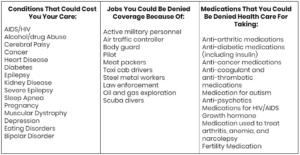We have reached a critical point for the future of American health care and the fate of the Affordable Care Act (ACA). On June 25th, Trump’s Department Of Justice (DOJ) and Republican-led states submitted their briefs in support of California v. Texas, the lawsuit seeking to strike down the ACA. If President Trump and Republicans have their way, 20 million Americans will lose their insurance coverage, 135 million Americans with pre-existing conditions will be stripped of their protections, and costs will go up for millions. The consequences of the lawsuit for America’s health care are particularly devastating at a time the country is gripped by the coronavirus crisis which threatens the health and safety of the entire nation.
No action would be more damaging to Americans’ health and safety than if the Trump administration achieves their desired goal of overturning the ACA in its entirety during this crisis. When the court hears this case, there will likely be no vaccine and no viable treatment for the virus. When millions of Americans have already lost health insurance due to the pandemic, it’s absurd that President Trump is arguing in court that 20 million more Americans should lose their health care. And when millions of Americans who contract the coronavirus join the 135 million Americans with a pre-existing condition, President Trump will also be arguing in court to allow insurance companies to deny them coverage or charge them more. The submission of these briefs from Republican states will put the Trump administration’s politically-motivated lawsuit on full display for the American people in front of the highest court.
Days of Action: Day 5 of 12 focuses on protections for people with pre-existing conditions. To learn more about our Days of Action, visit our website.
What’s At Stake: Protections for People with Pre-Existing Conditions
Without the ACA, protections for 135 million Americans with pre-existing conditions will be eliminated overnight, and the uninsured rate will increase by 65 percent. Making matters worse, if the ACA is struck down, everyone who contracts the coronavirus could be deemed as having a pre-existing condition and be at the mercy of their insurance companies who could refuse to pay for needed care. It’s critical that Americans understand just what’s at stake if this outrageous and irresponsible lawsuit succeeds.
The ACA included four key provisions that protect people with pre-existing conditions. If the law is overturned in the Texas lawsuit:
- GONE: Rule that forbids insurance companies from denying coverage to people with pre-existing conditions.
- GONE: Rule that prevents insurers from charging people with pre-existing conditions more.
- GONE: Requirements that insurance companies cover essential health benefits, such as prescription drugs and maternity care.
- GONE: Ban on insurance companies having lifetime caps on coverage.
Premium Surcharges Can Once Again Be In The Six Figures. Thanks to the Republican lawsuit, insurance companies can charge people more because of a pre-existing condition. The House-passed repeal bill had a similar provision, and an analysis by the Center for American Progress found that insurers could charge up to $4,270 more for asthma, $17,060 more for pregnancy, $26,180 more for rheumatoid arthritis and $140,510 more for metastatic cancer.
More Than 140 Million Americans Could Once Again Have To Pay For Preventive Care. Because of the ACA, private health plans must cover preventive services — like flu shots, cancer screenings, contraception, and mammograms – at no cost to consumers. More than 140 million Americans are enrolled in plans that provide free preventive services, including 133 million people with employer coverage.
Insurance Companies Would Not Have To Provide The Coverage You Need. The Affordable Care Act made comprehensive coverage more available by requiring insurance companies to include “essential health benefits” in their plans, such as maternity care, hospitalization, substance abuse care and prescription drug coverage. Before the ACA, people had to pay extra for separate coverage for these benefits. For example, in 2013, 75 percent of non-group plans did not cover maternity care, 45 percent did not cover substance abuse disorder services, and 38 percent did not cover mental health services. Six percent did not even cover generic drugs.
Reinstate Lifetime and Annual Limits On 109 Million Privately Insured Americans. Repealing the Affordable Care Act means insurance companies would be able to impose annual and lifetime limits on coverage for those insured through their employer or on the individual market. In 2009, prior to the implementation of the ACA, 59 percent of workers covered by employer-sponsored health plans had a lifetime limit.
Before the Affordable Care Act, insurance companies routinely denied people coverage because of a pre-existing condition or canceled coverage when a person got sick.

Republicans Want To Put Insurance Companies Back In Charge, Ending Protections For The 135 Million People With A Pre-Existing Condition
- According to a recent analysis by the Center for American Progress, roughly half of nonelderly Americans, or as many as 135 million people, have a pre-existing condition. This includes:
-
- 44 million people who have high blood pressure
- 45 million people who have behavioral health disorders
- 44 million people who have high cholesterol
- 34 million people who have asthma and chronic lung disease
- 34 million people who have osteoarthritis and other joint disorders
- More than 17 million children, 68 million women, and 32 million people aged 55-64 have a pre-existing condition.
American Cancer Society, American Cancer Society Cancer Action Network, American DIabetes Association, American Heart Association, American Lung Association, and National Multiple Sclerosis Society: “Striking Down These Provisions Would Be Catastrophic And Have Dire Consequences For Many Patients With Serious Illnesses.” [American Cancer Society et. al, 6/14/18]

